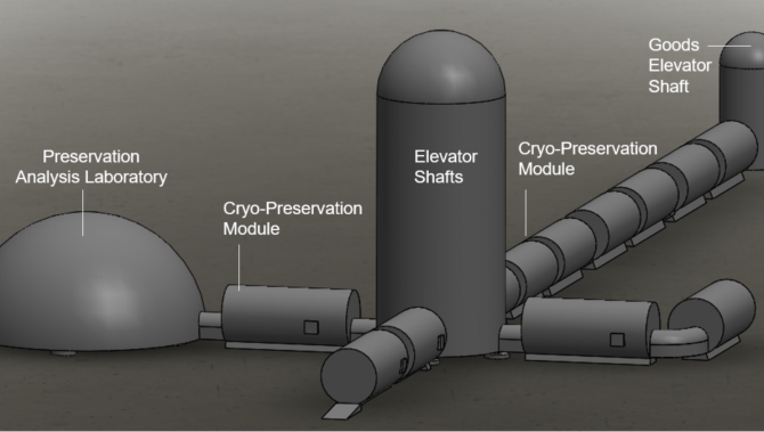UArizona researchers design 'lunar ark,' hoping to store reproductive cells on the moon

The team's model for the underground ark includes solar panels, elevator shafts and cryogenic preservation modules. (University of Arizona)
TUCSON, Ariz. - Scientists at the University of Arizona are creating what they call a "global insurance policy" -- a plan to save humankind in case of a global crisis.
The inspiration for their project came from the biblical story of Noah's ark. However, instead of preserving two of every animal, this team wants to gather millions of samples from Earth's species and preserve them on the moon.
The idea of a solar powered lunar ark might sound like it came out of a sci-fi novel, but Jekan Thanga says it's an out of this world idea that is just realistic enough to work.
Thanga is an assistant professor at the University of Arizona's Department of Aerospace and Mechanical Engineering, where he is leading a team working to cryogenically freeze reproductive cells from species on earth.
"Going after the grand idea of saving all the creatures, 6.7 million species, we think the starting time is going to be about 30 years," Thanga said.
Thanga says the fragility of the earth makes it a risky place to preserve genetic material from earth's animals and plants.
"As much as we want to, we are not in total control of our own planet," said the professor. "There are far too many disturbances that happen, far too many instabilities."
Instabilities like volcanoes, asteroids, climate change - and global pandemics like COVID-19.
"The mood came to mind from our other projects involving exploration of lava tubes, where we have learned these things have been pristine for three or four billion years and have likely been untouched," Thanga said.
Creating genetic backups to preserve biodiversity is not actually a new concept.
A vault in Norway holds the genetic samples of plant species from around the world, and it has already been used to reintroduce certain plants back into the wild.
However, Thanga says the vault is still at risk of being destroyed, which is why they they want to store the genetic information on the moon to ensure it survives any existential threats to earth.
Read more about the project here: https://news.arizona.edu/story/engineers-propose-solar-powered-lunar-ark-global-insurance-policy
For the latest local news, download the FOX 10 News app.
Tune in to FOX 10 Phoenix for the latest news:

